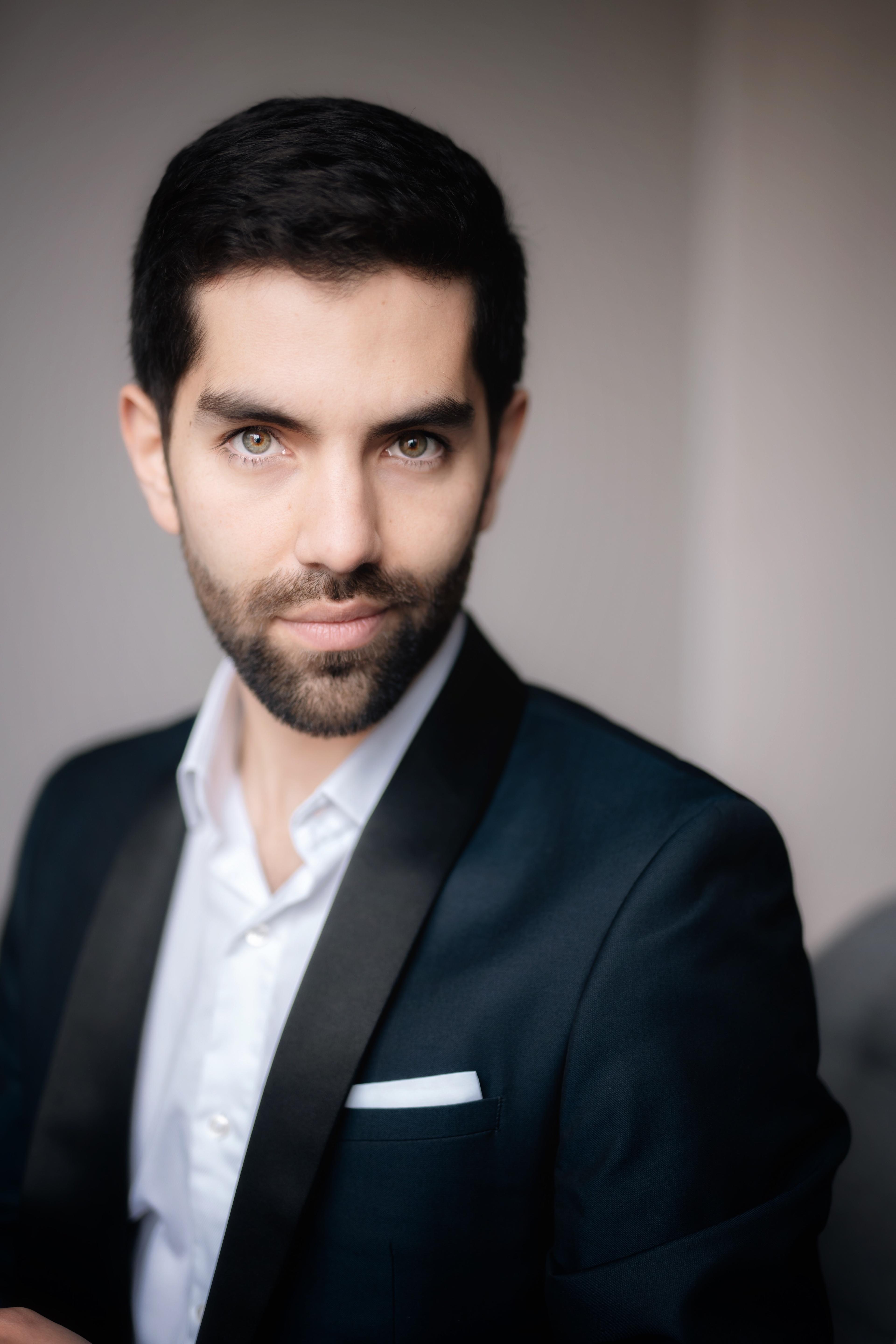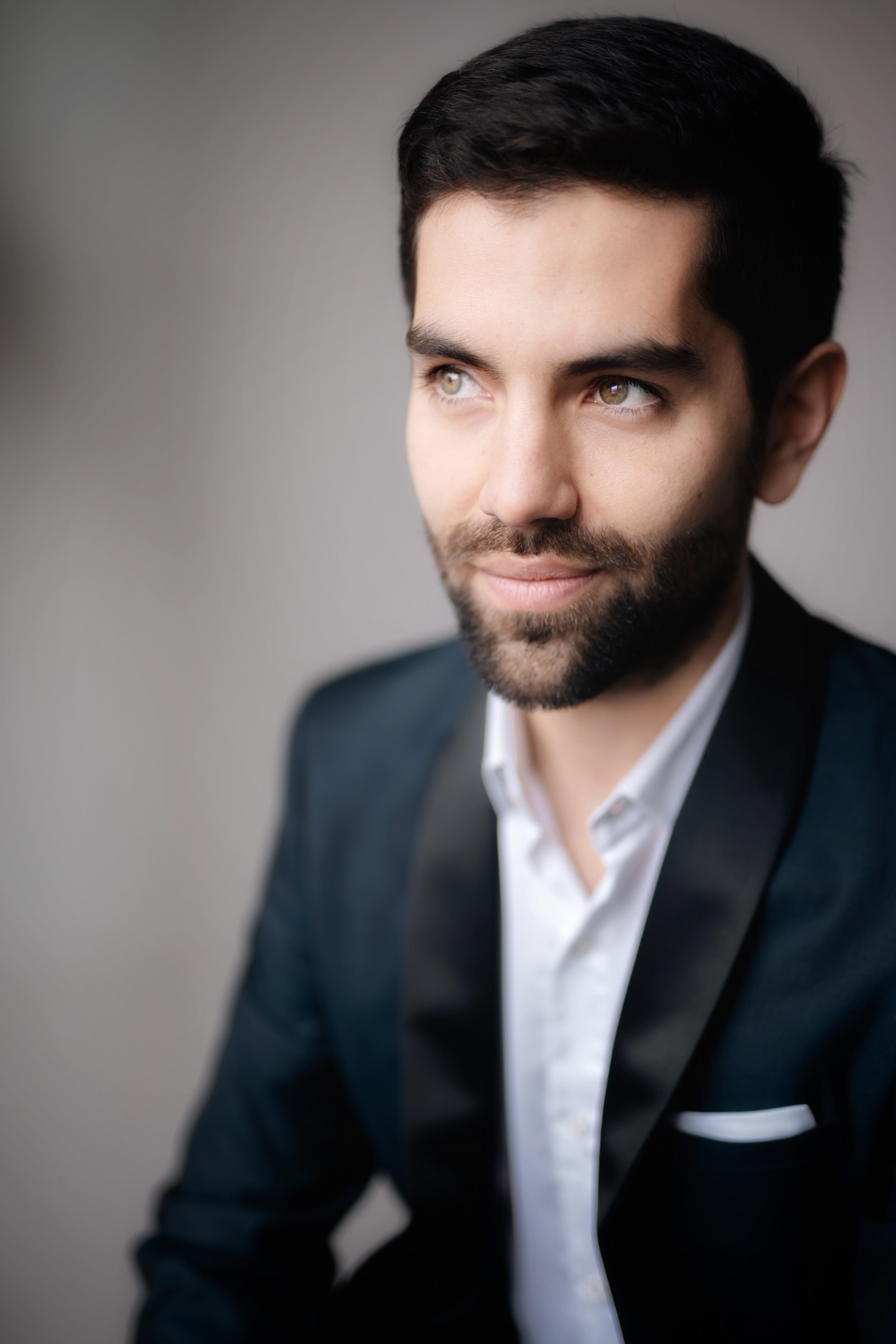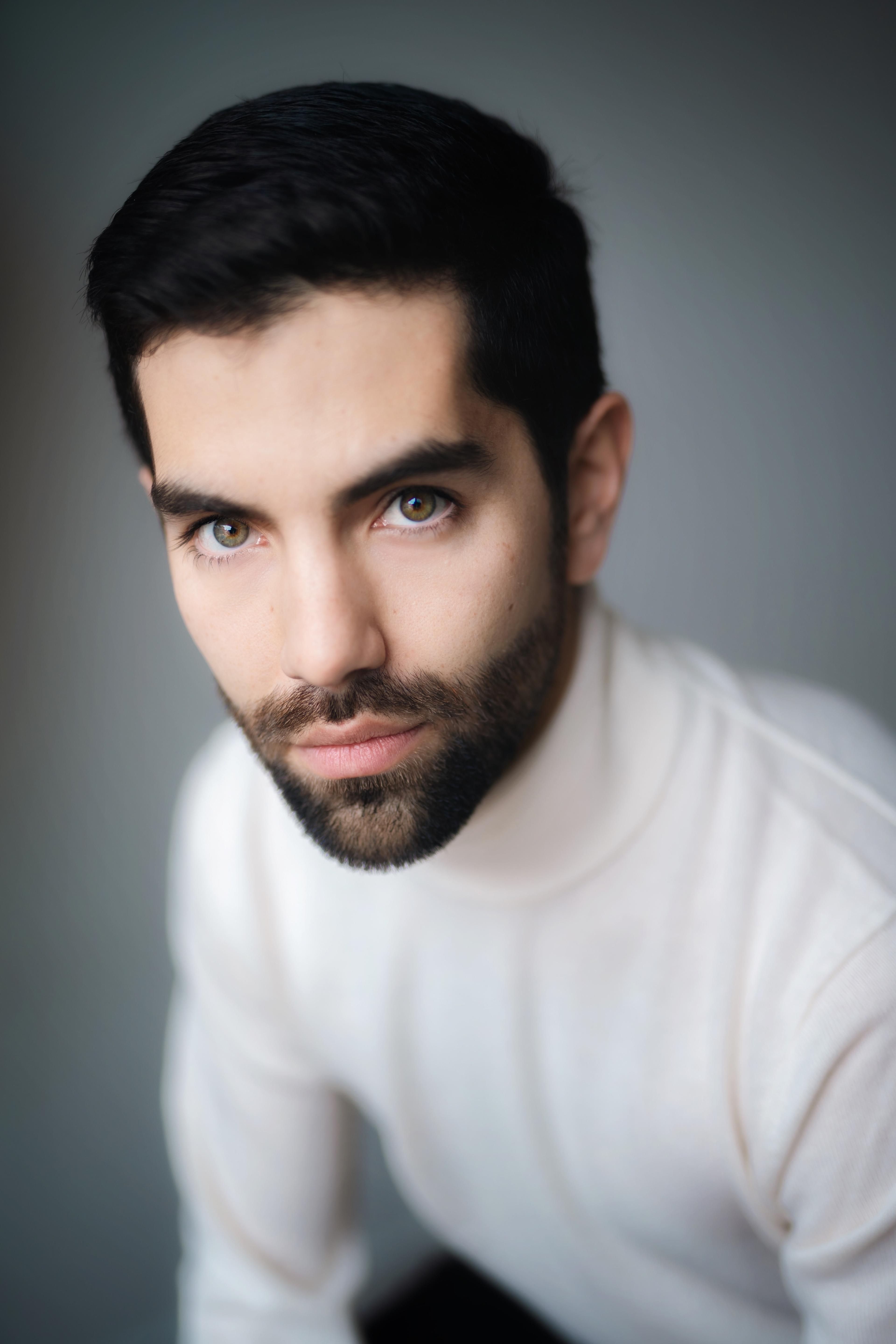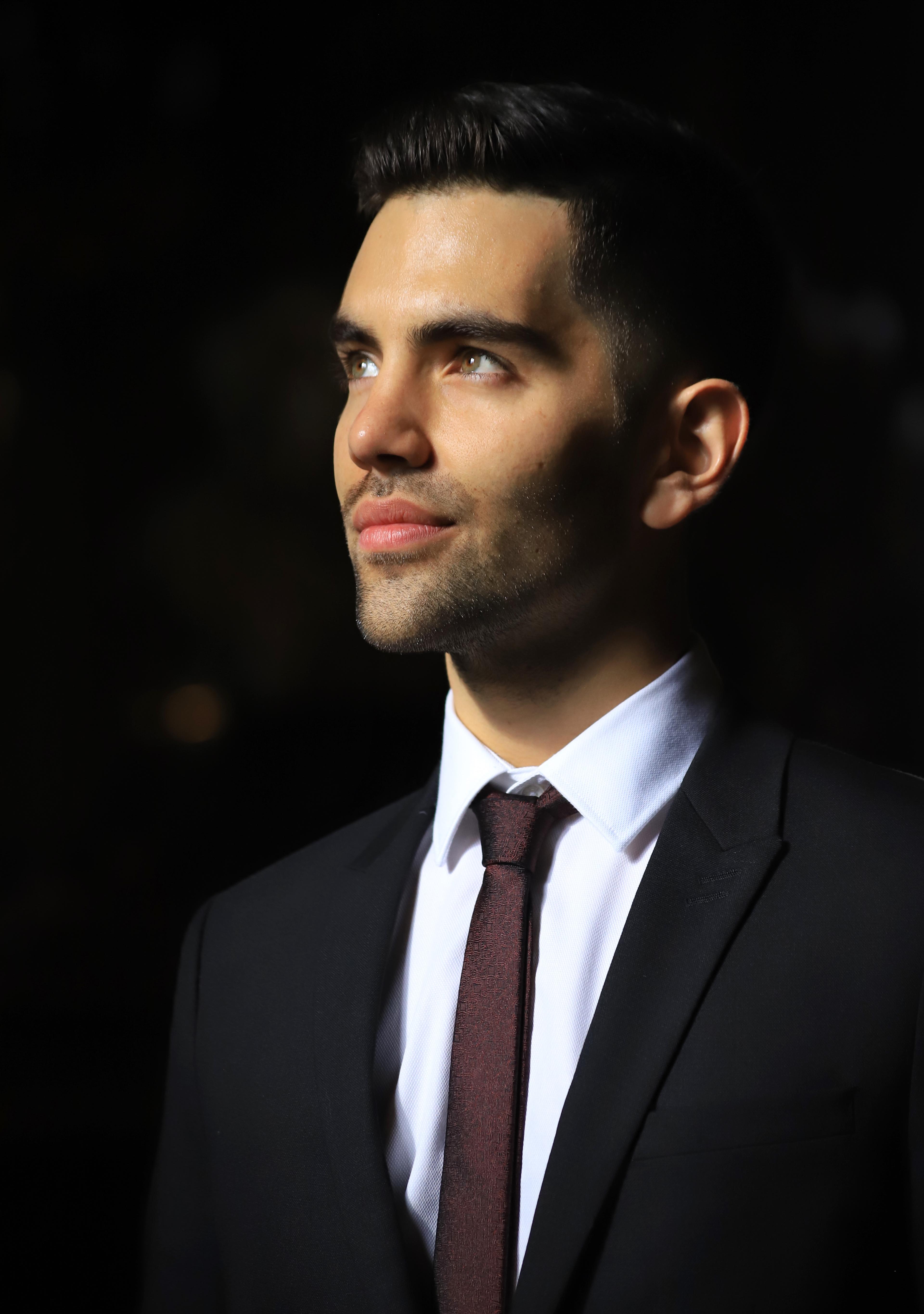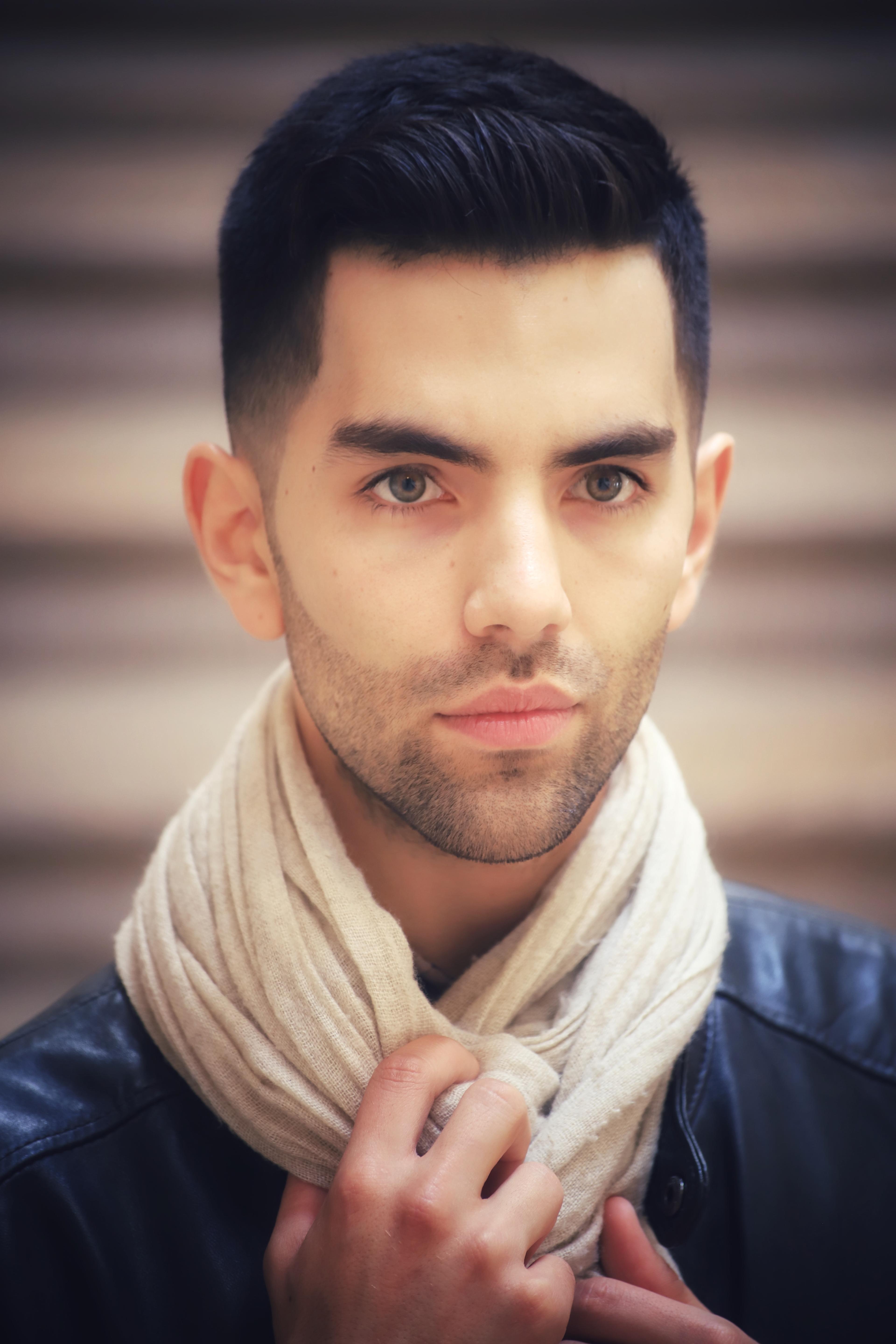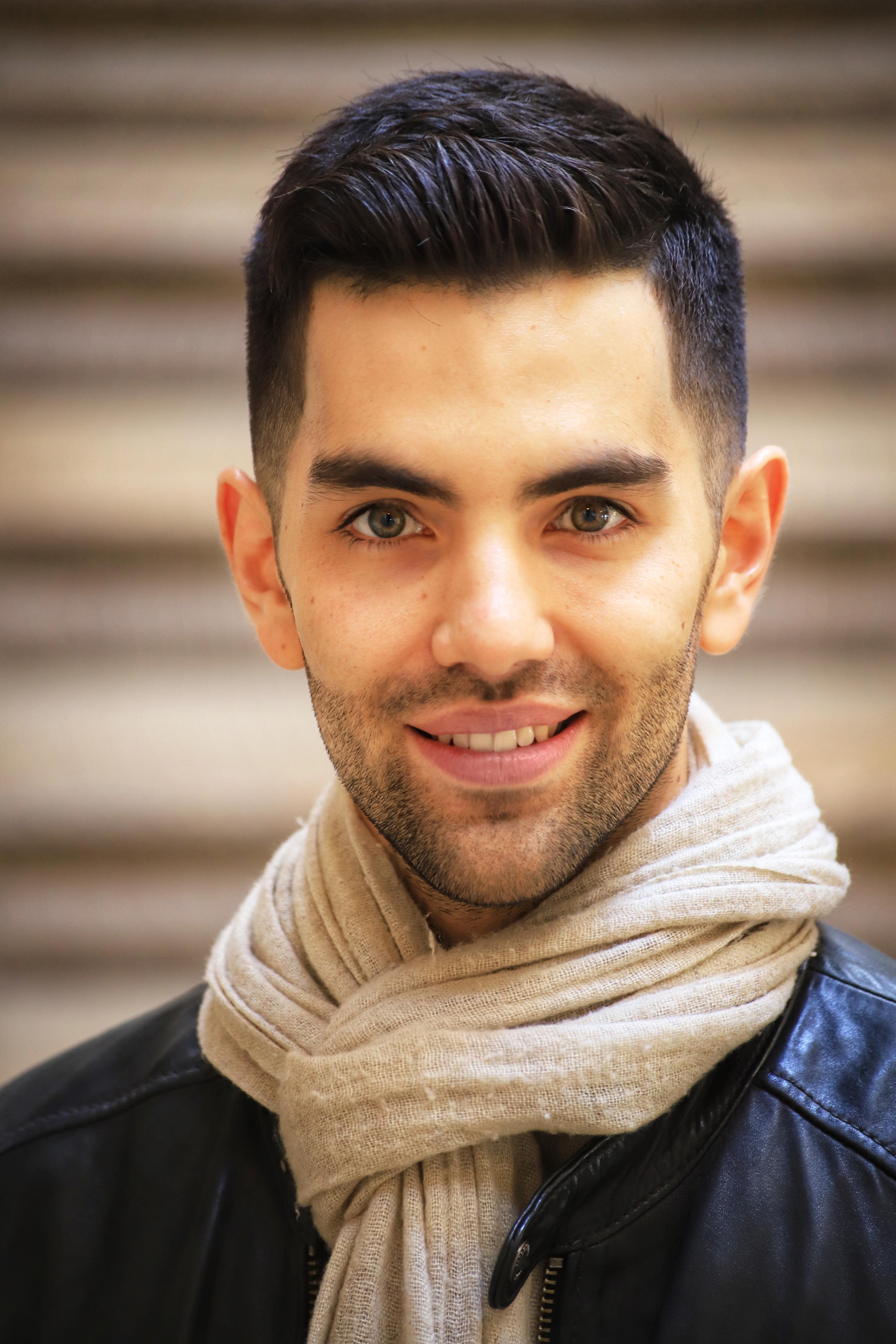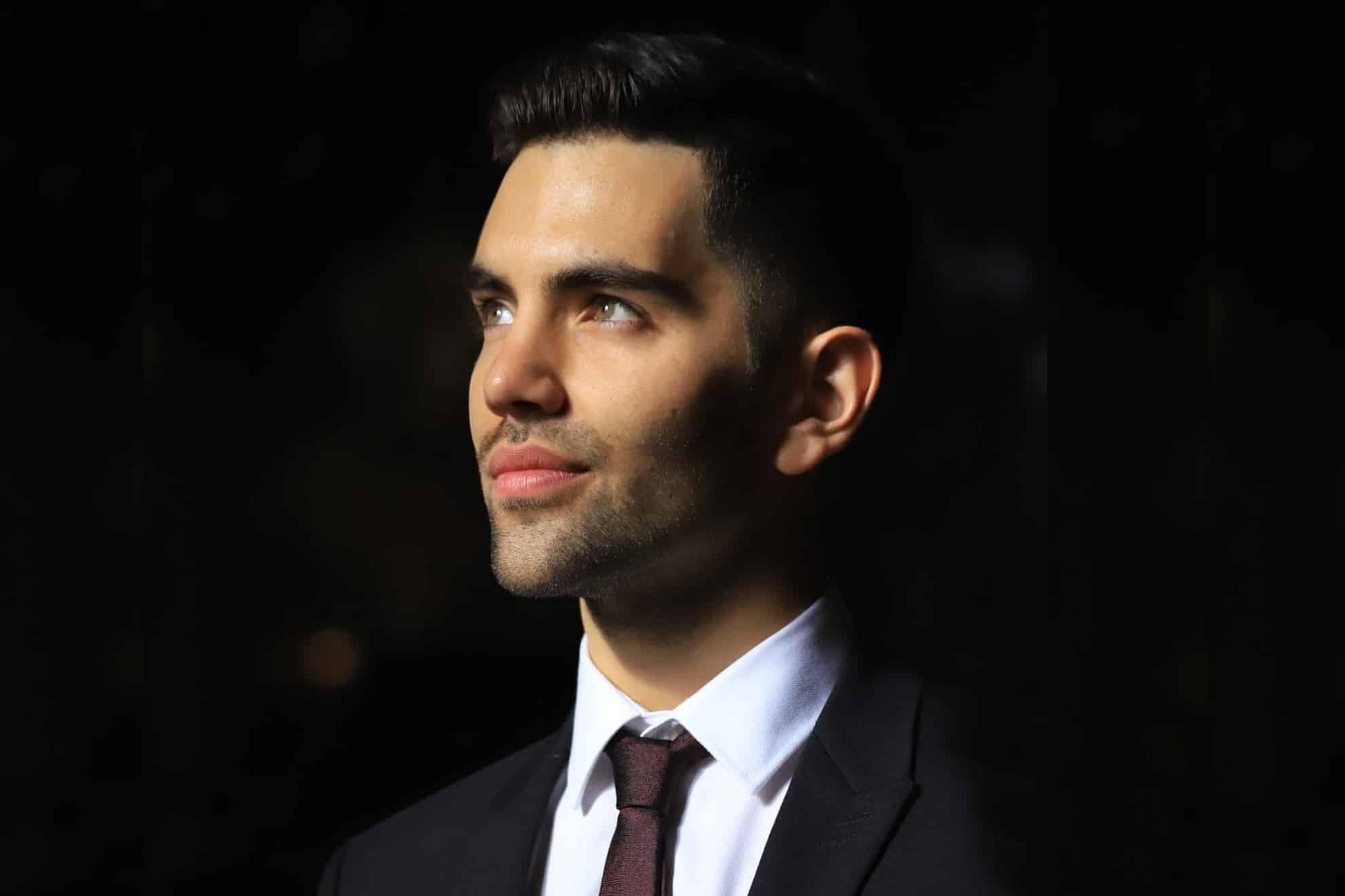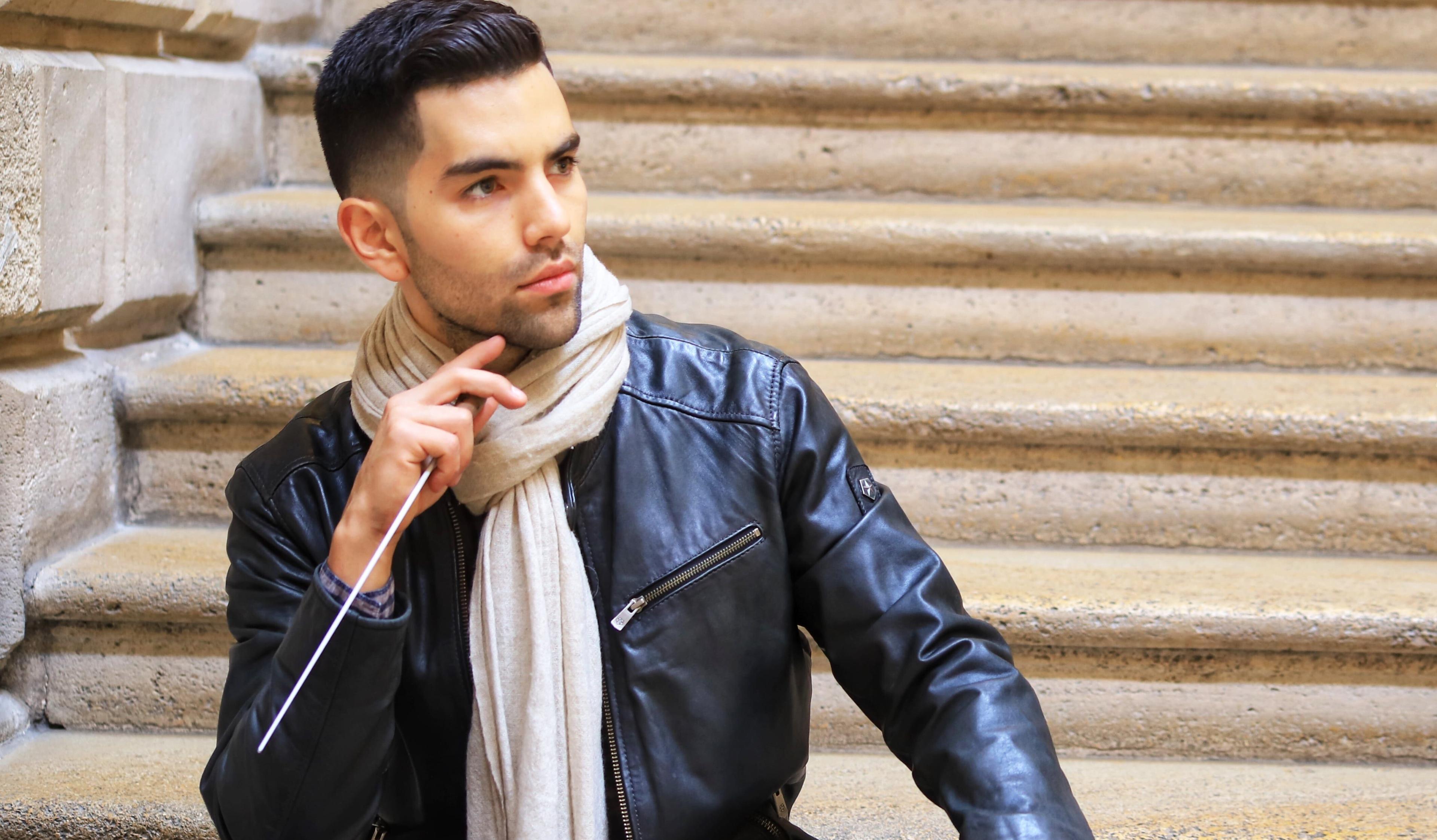MarcLeroy-Calatayud
- Conductor


About Marc
Principal Guest Conductor, Opéra de Tours (for 2025-2026 season)
Born and raised in Lausanne by a French father and a Bolivian mother, Marc held the position of Associate Conductor for L’Orchestre de Chambre de Genève for the 2022/23 season. This included a critically acclaimed semi-staged production of Gounod’s Roméo et Juliette with Benjamin Bernheim. He previously held the position of Artist-in-Residence of Orchestre National de Cannes for the 2021/22 season. For the 2025/26 season, Marc will be the Principal Guest Conductor of the Orchestre Symphonique Région Centre-Val de Loire/Tours.
Highlights for this season will include a return to the National Ballet of Japan (Frederick Ashton’s Cinderella), his staged opera debut with the Opéra National de Lorraine (Dialogues des Carmélites), opera gala performances in Bilbao with Xabier Anduaga and Nadine Sierra, his debut performances at the Bayerische Staatsoper (John Cranko’s Onegin), a concert performance of La voix humaine with Patricia Petibon at the Opéra National de Lyon, performances of Meyerbeer’s Le Prophète with Marina Viotti, John Osborn, and the Orchestre de Chambre de Genève in Geneva & Paris, and a debut appearance at the Hamburg Elbphilharmonie for a gala concert with Benjamin Bernheim & Nordwestdeutsche Philharmonie.
Recent symphonic highlights have included Orchestre National d’Île de France, Orchestre Philharmonique Royal De Liège, Orchestre de la Suisse Romande, Tokyo Philharmonic, Oviedo Filarmonia, and Orchestre de Chambre de Genève. Opera highlights include Théâtre des Champs-Élysées with Les Siècles (Werther), Lausanne Opera (Fortunio), and his debut at Wiener Staatsoper (Roméo et Juliette).
He has recently worked with orchestras including Real Filharmonia de Galicia, Orchestra di Padova e del Veneto, Orchestre Philharmonique de Nice, Opéra de Massy, Opéra de Saint-Étienne, Orchestre de Chambre de Lausanne, an extensive Japanese tour with Kanazawa Orchestra Ensemble, Orchestre National du Capitole de Toulouse, Musikkollegium Winterthur, Orchestre National Bordeaux-Aquitaine, Orchestra della Toscana, and Ensemble Modern Frankfurt.
Marc was Assistant Conductor at the Opéra National de Bordeaux from 2016 to 2019 where he regularly conducted opera and ballet performances, as well as symphonic concerts. He is a conducting fellow of the Akademie Musiktheater Heute (2018–2021) and studied conducting in Vienna and Zürich with Mark Stringer and Johannes Schlaefli.
Contact
Availability & General Enquires

Adam Brady
Contracts, Logistics & Press

Philip Keegan
Representation
Season Highlights
Video
- Playing
Marc Leroy-Calatayud: "Werther" at Théâtre des Champs-Élysées (Bernheim, Viotti, Les Siècles)
Credit: Les Siècles
Marc Leroy-Calatayud conducts Roméo et Juliette (Gounod), Excerpts from Act I
Roméo et Juliette (Gounod) Excerpts from Act I Benjamin Bernheim Sandra Hamaoui Jean-Sébastien Bou … L’Orchestre de Chambre de Genève Ensemble Vocal de Lausanne Recorded Jan. 2023 in Geneva Credit: L’Orchestre de Chambre de Genève Ensemble Vocal de Lausanne Recorded Jan. 2023 in Geneva
Marc Leroy-Calatayud conducts Mozart, Symphony No. 35, Andante (excerpt)
Marc Leroy-Calatayud conducts Mozart, Symphony No. 35, Andante (excerpt) performed by Orchestra Regionale della Toscana in June 2021. Credit: Marc Leroy-Calatayud
Prokofiev’s ‘Cinderella’ with Marc Leroy-Calatayud and Opéra National de Bordeaux
SERGEI PROKOFIEV Cendrillon (Exerpts) Music Director: Marc Leroy-Calatayud Choreography: David Bintley Sets & Costumes: John MacFarlane Lighting: David A. Finn Lighting Design: Peter Teigen Ballet de l’Opéra National de Bordeaux Orchestre National Bordeaux Aquitaine Grand Théâtre de Bordeaux, 10-31 Dec 2019 Credit: Grand Théâtre de Bordeaux, 10-31 Dec 2019
Marc Leroy-Calatayud Conducts Opéra National de Bordeaux in The Barber of Seville
Gioachino Rossini: Il Barbiere di Siviglia (extracts) Opéra National de Bordeaux February 2019 Credit: Opéra National de Bordeaux
Photos
News
Press
Opéra National de Lorraine | Dialogues des Carmelites
NancyJan 2026Moreover, the work is conducted no longer by the highly talented Ben Glassberg, but by the no less refined and promising Marc Leroy-Calatayud. What emerges here with particular clarity is the care, attention, and delicacy with which the conductor approaches this work, while inscribing it within a tradition of balance and elegance that is distinctly French. In an opera that can at times be imposing and massive—where Poulenc does not always deal in fine lace—Marc Leroy-Calatayud opts for a form of orchestral restraint which, given such a subject, borders on a certain idea of courage. Under his consistently judicious direction, the Orchestre de l’Opéra national de Lorraine displays all its nobility.
- Bachtrack
- 31 January 2026
In the pit, the Orchestre de l’Opéra national de Nancy-Lorraine proves attentive and highly responsive to the stage, producing a perfectly homogeneous and dense orchestral sound. Marc Leroy-Calatayud’s conducting, fluid and pliable, embraces the full thrust of Poulenc’s orchestration—without ever constraining the voices—while giving equal weight to its moments of delicacy.
- ResMusica
- 25 January 2026
The orchestra is clad in beautiful colours—particularly the woodwinds—under the attentive baton of Marc Leroy-Calatayud.
- Forum Opéra
- 25 January 2026
At the head of both orchestra and chorus, Marc Leroy-Calatayud conducts Poulenc’s fascinating score with poise and exquisite sensitivity, while fully embracing its more tragic and dramatic dimension, notably in the deeply moving final scene. He succeeds admirably in maintaining overall musical cohesion despite the interruptions imposed by the staging.
- Olyrix
- 25 January 2026
Leading the orchestra, the young Swiss conductor Marc Leroy-Calatayud manages to alternate extended hedonistic sequences with moments of tension requiring metronomic precision from the musicians. His broad, expansive beat allows Poulenc’s music to unfold in wide iridescent sonorities; yet it is above all in the most intimate dialogues—reduced to two or three characters—that he achieves the tour de force of being grand in detail, eloquent in silence, and restrained in the expression of passion.
- Première Loge
- 25 January 2026
Charles Gounod: Roméo et Juliette
Wiener StaatsoperMay 2025[...] Marc Leroy-Calatayud had the orchestra well under control. He led a robust, dramatic, quite nuanced, and above all pleasantly tight performance to its admittedly deadly conclusion.
- Jens F. Laurson, Die Presse
- 07 May 2025
Jules Massenet: Werther Théâtre des Champs-Élysées
Théâtre des Champs-ÉlyséesMar 2025 - Apr 2025The orchestral score of Massenet’s Werther can be played in very different ways. You can go Wagnerian, emphasising the times when the brass thickens the texture. You can tug at the heartstrings with Puccinian string swell. Or, as was done by Marc Leroy-Calatayud, conducting Les Siècles at the Théâtre des Champs-Élysées last night, you can mine the score for detail, with millimetre calibration of instrumental balance to bring out as many nuances as you can find. What particularly impressed was the way that Leroy-Calatayud made space for individual instruments and voices to shine. He would take down the level to allow a softer voice to be heard, allow the brass to come in with a subito fortissimo that would have satisfied Wagner, then take it straight down to make way for a woodwind solo. It’s the first time I’ve heard this conductor and I want to hear more.
- David Karlin, Bachtrack
- 23 March 2025
All the more so as the singers are carried throughout by the attentive and inspired direction of a young conductor in his thirties, Marc Leroy-Calatayud, whose constant pursuit of balance between the orchestra — Les Siècles, with its rich instrumental colors — and the voices provides more than just a setting: it offers an exemplary partnership for this cast. For he knows how to fully bring out the symphonic dimension without ever overpowering the voices, skillfully adjusting the counterpoints of the strings or brass so they resonate beneath the voices, intertwining like supple vines without disturbing the vocal phrasing — and he also knows, during purely symphonic interludes, how to unleash vibrant colors that express passion beyond words, a fervor woven into the drama. A fine baton to watch!
- Alain Duault, OperaOnline
- 25 March 2025
The good ideas in the staging [...] tend to narrow the focus. The same cannot be said of Marc Leroy-Calatayud's conducting, where one feels at every moment a deep love and understanding of this rich and personal music. He draws remarkably accurate colors from the period instruments of the orchestra Les Siècles — both in their slightly raw directness and in the subtle blends of timbres imagined by Massenet, a true orchestrator-colorist.
- Christian Merlin, Le Figaro
- 23 March 2025
At the helm of a brilliant Les Siècles orchestra, conductor Marc Leroy-Calatayud [...] embraces certain artistic choices — which, for our part, we found entirely convincing: marked by great refinement and constant attention to the smallest details of the orchestration, his interpretation occasionally unleashes astonishing orchestral violence — from the very prelude — thus providing a perfect sonic counterpart to Christof Loy’s stage direction [...]. Also noteworthy are certain rather slow tempi (such as in 'Je vous écris de ma petite chambre,' or the aria of the tears), which seem to suspend time and create an introspective pause within the dramatic progression.
- Stéphane Lelièvre, Première Loge
- 23 March 2025
Jules Massenet: Werther Geneva and Strasbourg
Victoria Hall Genève, Opéra du Rhin StrasbourgJan 2025 - Feb 2025Massenet’s orchestration blends refinement and expressiveness, and Marc Leroy-Calatayud masterfully brings out both qualities. It must be said that he has at his command a musical ensemble, the Orchestre de Chambre de Genève, that is full of resources. Soft and nuanced, delicate and transparent, yet also dark and expressive, the Orchestre de Chambre de Genève and Marc Leroy-Calatayud reach peaks of darkness and drama in the dense and expressive orchestration of the fourth act. Lyrical and melancholic woodwinds, warm yet taut strings, brass with controlled tension [...] together, they create an intimate and intensely emotional atmosphere that greatly contributes to the success of the evening.
- Romaric Hubert, Première Loge
- 01 February 2025
On this occasion, the Orchestre de Chambre de Genève, under the baton of Marc Leroy-Calatayud—whose qualities as an opera conductor we have previously highlighted: both firmness and flexibility—showed his particular affinity for the French repertoire. A Roméo et Juliette, under similar conditions to this Werther, and a Fortunio just a few weeks ago, had already demonstrated his ability to bring out the colors and true flavor of these scores. In Werther, he superbly renders the symphonic passages, particularly the beautiful prelude to the second act, by carefully layering the sound textures. But what stands out most is the fluidity of his conducting (along with his remarkably elegant gestures) and his attentiveness to the singers. It is not easy to have singers positioned behind him (nor is it easy for them). The young conductor slightly turns his head to indicate an entrance, staying very close to them—and very close to the text as well, which can be read on his lips. The connection is evidently perfect. At the moment of Werther’s death, he leads the strings in an extraordinarily slow pianissimo as they accompany the hero’s final phrases, "Au fond du cimetière, il est deux grands tilleuls, c’est là que pour toujours je voudrais reposer," a heartbreaking funeral march upon which Pene Pati once again works his intangible magic. A peak of emotion that the audience released through a long-standing ovation.
- Charles Sigel, Forumopéra
- 02 February 2025
At the head of the Orchestre de Chambre de Genève, reinforced by students from the Haute École de Musique, conductor Marc Leroy-Calatayud played a significant role in the evening’s success. Born in Lausanne to a French father and a Bolivian mother, his name is one to remember—surely synonymous with a promising career. He is particularly attentive to the singers, positioned in front of him and behind him, turning toward them at every entrance. His interpretation of Werther is elegant and refined, with rather slow tempos, but what stands out most are the contrasts and dynamics, with a keen sense of theatricality. Stunning pianissimi alternate with magnificent fortissimo passages, including remarkable symphonic sections. The audience gave a standing ovation to this concert version of Werther.
- C. Poloni, Concertonet
- 02 February 2025
Marc Leroy-Calatayud, leading a Geneva-based ensemble of measured size, takes a different approach: that of maintaining narrative continuity. His conducting, extremely fluid and responsive, turns the orchestra into a true actor in the drama, thanks to a pulse that is both vibrant and restrained. The musicians react like a substance in turmoil, which the conductor either calms to an almost imperceptible tremor or allows to flow more eruptively when needed, up to controlled explosions (such as when the strings slap and scratch in the final phrases of the first act after Werther’s cry, "Un autre ! Son époux ! »). This supple and well-risen sonic texture follows the dramatic twists of the action with rare responsiveness, always expressive without excess in color or volume. From the very first introductory chords, the conductor reassures us: his ensemble, ever-present on stage, will never be overwhelming, the driving forces of the action will resonate without hindering the soloists, and he will have his hands full as he spends hours craning his head to keep an eye on the solo singers positioned behind him, with whom he remains in constant interaction. This allows him to tighten the dramatic tension at key moments and to let the atmosphere relax in more comedic scenes, particularly in the second act. He masterfully conveys the characters' emotions through rhythm: the rush of "J’aurais sur ma poitrine" perfectly mirrors Werther’s racing heart. He makes the audience feel the smoldering fire, ready to ignite, during the second act duet between Charlotte and Werther ("N’est-il donc pas d’autre femme ici-bas digne de votre amour… "). Yet, his pulse never falters: while many conductors lose control during the exuberant moments of the first act, where the characters' joy bursts forth in complex rhythms ("Koffel a mis sa redingote, Steiner a retenu le cheval du brasseur, Hoffmann a sa calèche et Gouden sa berline," as Schmidt says), he maintains an impressive grip on the ensemble (notably in the duet between Johann and Schmidt at the beginning of the second act, which has the air of a Bach chorale).
- P. Manoli, Cult.news
- 05 February 2025
Bizet's L'Arlésienne and Le Docteur Miracle
Opéra de ToursOct 2024 - Oct 2024Cette fois, dans la fosse de l’Opéra de Tours, c’est l’Orchestre symphonique Région Centre Val-de-Loire/Tours qui donne à entendre tout le raffinement de l’écriture de Bizet, sous la baguette experte de Marc Leroy-Calatayud : si Bizet n’avait en 1872 que vingt-sept musiciens à sa disposition, on profite cette fois d’un tout autre confort sonore, qui rend pleinement justice à sa partition, et l’on souhaite qu’il soit aussi bien servi par les autres formations musicales qui l’escorteront durant les nombreuses étapes de la tournée qui va commencer et qui, cette saison, s’achèvera en mai-juin au Théâtre du Châtelet. This time, in the orchestra pit of the Opéra de Tours, it is the Orchestre Symphonique Région Centre Val-de-Loire/Tours that brings out all the refinement of Bizet's composition, under the expert baton of Marc Leroy-Calatayud. While Bizet had only twenty-seven musicians at his disposal in 1872, we now benefit from a much richer sound, which fully does justice to his score. We hope that other musical ensembles accompanying it during the numerous stops of the upcoming tour, which this season will conclude in May-June at the Théâtre du Châtelet, will serve it just as well.
- Laurent Bury, Concertclassic
- 05 October 2024
Dans la fosse, Marc Leroy-Calatayud fait honneur à la partition en réussissant aussi bien à porter les élans lyriques demandés qu’à ménager des moments de délicatesse qui mettent en valeur la finesse de l’orchestration de Bizet. Sa direction, extrêmement attentive à l’équilibre avec le plateau, vaut par sa souplesse. In the pit, Marc Leroy-Calatayud does justice to the score, successfully conveying both the required lyrical surges and crafting moments of delicacy that highlight the finesse of Bizet's orchestration. His conducting, highly attentive to maintaining balance with the stage, stands out for its flexibility.
- Pierre Venissac, Forumopera
- 08 October 2024
Marc Leroy-Calatayud dirige un orchestre qui était celui de la création. Il fait de la véritable musique de scène, genre dont il retrouve les codes créant le décor, le climat scénique et les coups de théâtre. Il fait entendre la richesse de la partition, son souffle mélodique et rythmique, qui annonce les œuvres à venir et plusieurs idées musicales de Carmen. Le jeune chef déjà applaudi dans Ô mon bel inconnu est soucieux du théâtre essentiel dans le répertoire léger. Marc Leroy-Calatayud conducts an orchestra similar to the original production. He creates authentic stage music, rediscovering the codes of the genre, shaping the atmosphere, the scenic mood, and the dramatic twists. He brings out the richness of the score, its melodic and rhythmic vitality, foreshadowing future works and several musical ideas from Carmen. The young conductor, already applauded in Ô mon bel inconnu, is deeply attentive to the essential theatricality of the light opera repertoire.
- Didier Roumilhac, Résonances lyriques
- 06 October 2024
La conduite minutieuse du chef Marc Leroy-Calatayud souligne le génie orchestral de Bizet et son art de mêler les timbres. The meticulous direction of conductor Marc Leroy-Calatayud highlights Bizet's orchestral genius and his art of blending different timbres.
- Pierre Giangiobbe, Olyrix
- 06 October 2024
Reynaldo Hahn - Ô mon bel inconnu
l’Opéra de ToursDec 2022Marc Leroy-Catalayud, qui est sur le podium pour cette série, est attentif à tout ce qui se passe sur le plateau et dirige la phalange tourangelle d’une main ferme ; les nuances sont quasi parfaites car à aucun moment les chanteurs ne sont couverts. Quant aux tempos, ils sont idéaux et le jeune chef d’orchestre démontre avec brio qu’il a parfaitement compris l’esprit même de l’œuvre de Hahn. Marc Leroy-Catalayud, who is on the podium for this series, is attentive to everything that happens on the set and leads the Touraine company with a firm hand; the nuances are almost perfect because at no time are the singers covered. As for the tempos, they are ideal and the young conductor brilliantly demonstrates that he has perfectly understood the very spirit of Hahn's work.
- Hélène Biard, Toute la Culture
- 20 December 2022
Reynaldo Hahn - Ô mon bel inconnu
l’Opéra de ToursNov 2023Imprimant lui aussi une belle vitalité à la partition, Marc Leroy-Catalayud dirige l’Ouverture tout feu tout flamme, avant de doser les sonorités de l’Orchestre symphonique région Centre Val-de-Loire / Tours [...] Le finale de l’acte II (« Partons ! »), particulièrement enlevé et dont la musique colle à celui du III (« Partez ! ») est un bijou dont nous ne perdons pas un mot. Also imbuing the score with great vitality, Marc Leroy-Catalayud conducts the Overture all fire, all flame, before measuring out the sounds of l’Orchestre symphonique région Centre Val-de-Loire / Tours [...] The finale of Act II ("Partons !"), particularly spirited and whose music matches that of Act III's "Partez !" is a gem of which we do not miss a word.
- François Laurent, Diapason
- 19 December 2022
Reynaldo Hahn - Ô mon bel inconnu
l’Opéra de ToursNov 2023Dans la fosse, Marc Leroy-Calatayud met en valeur tout le raffinement de l’écriture de Reynaldo Hahn : en dehors de quelques pages plus rythmées (l’air de Félicie et son duo avec M. Victor, les ensembles concluant les deuxième et troisième actes), la partition se situe plutôt du côté de la douceur et de la rêverie, aspects auxquels rend tout à fait justice l’Orchestre symphonique région Centre-Val de Loire/Tours. In the pit, Marc Leroy-Calatayud highlights all the refinement of Reynaldo Hahn's writing: apart from a few more rhythmic sections (Félicie's aria and duet with M. Victor as well as the ensembles which conclude the second and third acts), the score is more on the side of softness and daydreaming, aspects to which the l'Orchestre symphonique region Centre-Val de Loire/Tours does justice.
- Laurent Bury, Concert Classic
- 19 December 2022
Benjamin Bernheim Gala - Orchestre national du Capitole
Théâtre du CapitoleJul 2021À la tête de l’Orchestre national du Capitole, le jeune chef vaudois Marc Leroy-Calatayud s’attache à ciseler cet ouvrage rare (et que certains trouvent « mineur ») avec autant de soin et d’amour que s’il s’agissait d’un chef-d’œuvre confirmé : textures sonores aérées, rythmique assurée et précise, sensibilité frémissante, telles sont les caractéristiques interprétatives que sa baguette distille à ce petit bijou symphonique. At the head of the Orchestre national du Capitole, the young conductor Marc Leroy-Calatayud sets out to carve this rare work […] with as much care and love as if it were was a confirmed masterpiece: airy sound textures, assured and precise rhythmic, quivering sensitivity, such are the interpretive characteristics that his baton exudes to this little symphonic jewel.
- Opera Online
- 22 July 2021
Donizetti: L'élisir d'amour
Théâtre des Champs-ElyséesMar 2021À la tête de l’Orchestre des Frivolités Parisiennes, en effectif réduit, Marc Leroy-Calatayud met en relief toute la saveur de l’instrumentation colorée de Donizetti dans un discours d’une rare élégance. Leading the Orchestre des Frivolités Parisiennes, in a reduced version, Marc Leroy-Calatayud highlights all the nuances of Donizetti's colourful instrumentation in a display of rare elegance.
- Alfred Caron, Opéra Magazine
- 01 March 2021
Donizetti: Lélisir d'amour
La battue de Marc Leroy-Calatayud elle, est tonique et bien en phase avec la joyeuse troupe déchainée qui évolue sur scène. Marc Leroy-Calatayud's conducting is invigorating and attentive towards the joyful troupe on stage.
- Toute la Culture
- 04 April 2021
